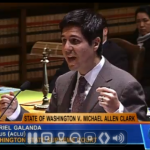Gabe Galanda has published an article, "Galanda Washington Tribal-State Relations Bar Bulletin," in this month's King County Bar Bulletin, which is themed, "polarity." Dedicating the piece "to those Washington Indians who fought the fish wars and to the tribal lawyers who won the Boldt Decision," he recaps modern Indian legal history in Washington and concludes with criticism that the Washington Supreme Court's three most recent Indian law decisions are regressive.
Polarity accurately describes the historic legal relationship between the State of Washington and those Tribal Governments indigenous to our state. Tribal sovereignty, i.e., “the right of reservation Indians to make their own laws and be ruled by them,” has always been antipodal to state sovereignty as a matter of Anglo-American jurisprudence. So much so, that by the late 1800s nascent states were deemed the Tribes’ “deadliest enemies” by none other than the U.S. Supreme Court. And over the ensuing century, tribal and state governments waged a zero-sum battle over who would regulate Indian Country.
But today, in what is the era of Indian self-determination as a matter of both federal policy and tribal behavior, tribal/state opposition is waning. As noted by leading Indian law scholar, Professor Matthew T. Fletcher:
States and tribes are beginning to smooth over the rough edges of federal Indian law — jurisdictional confusion, historical animosity between states and Indian tribes, competition between sovereigns for tax revenue, economic development opportunities, and regulatory authority — through cooperative agreements. In effect, a new political relationship is springing up all over the nation between states, local units of government, and Indian tribes.
Washington tribal/state relations and the new political relationship between our state’s sovereigns are indeed evolving. Still, based on the Washington Supreme Court’s three most recent three Indian law decisions, more progress is required to achieve tribal/state congruity throughout official state policy. In particular, the increasingly cooperative relationship between the Tribes and State must be better appreciated when the Court next evaluates regulatory power or adjudicatory jurisdiction in Washington Indian Country.
Gabriel "Gabe" Galanda is a partner at Galanda Broadman PLLC, of Seattle, an American Indian owned law firm. He is an enrolled member of the Round Valley Indian Tribes of Covelo, California. Gabe can be reached at 206.300.7801 or gabe@galandabroadman.com.










